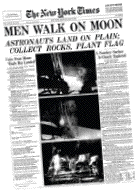Home > Archive > 2009 > June > 30
While you were sleeping, from Berlin
Tuesday, June 30, 2009 by Dave Winer.
 It's 9:11AM as I write this, and back home in California, it's just after midnight. I've done this so many times, but it still seems something of a miracle. How a day can be starting and another day be ending, all at the same time.
It's 9:11AM as I write this, and back home in California, it's just after midnight. I've done this so many times, but it still seems something of a miracle. How a day can be starting and another day be ending, all at the same time. ![]()
Glad to see Scoble blogging again. I predict a return to blogging as people discover the power of being able to finish a thought, and to link to another site without going through an intermediary. Once again people will discover the power of Small Pieces, Loosely Joined. ![]()
Chris Anderson is right, of course -- and uses a device to bait the press to object. Good way to sell books, perhaps, but I'd rather he'd not taken the shortcut. Malcolm Gladwell objects, and my friend Howard Weaver says that Gladwell got it right. I don't agree. When you think of news as a business, except in very unusual circumstances, the sources never got paid. So the news was always free, it was the reporting of it that cost. ![]()
What Anderson calls "Free" -- we in Rebooting The News call Sources Go Direct. Absolutely nothing strange about it. The Internet always disintermediates. Did you see the "media" in the middle of that word? It's the middle that's hurt in the new world. Sorry. The new world pays the source, indirectly, and obviates the middleman. ![]()
Following up on yesterday's piece about Wikipedia, I wrote it, unintentionally, so that people reacted to the bit that's uncontroversial and missed the controversy. Of course it's good that the reporter escaped and his life was spared. Who could think otherwise. ![]()
"What about when information on Wikipedia, true or not, hurts people in other ways? Why shouldn't anyone be able to get whatever they want redacted?" ![]()
Clearly some people can get stuff redacted sometimes. ![]()
Who, and under what circumstances? ![]()
Further, no one has that power over the web. Would it be better if Wikipedia worked like the web? ![]()
Recent stories
 Dave Winer, 54, pioneered the development of weblogs, syndication (RSS), podcasting, outlining, and web content management software; former contributing editor at Wired Magazine, research fellow at Harvard Law School, entrepreneur, and investor in web media companies. A native New Yorker, he received a Master's in Computer Science from the University of Wisconsin, a Bachelor's in Mathematics from Tulane University and currently lives in Berkeley, California.
Dave Winer, 54, pioneered the development of weblogs, syndication (RSS), podcasting, outlining, and web content management software; former contributing editor at Wired Magazine, research fellow at Harvard Law School, entrepreneur, and investor in web media companies. A native New Yorker, he received a Master's in Computer Science from the University of Wisconsin, a Bachelor's in Mathematics from Tulane University and currently lives in Berkeley, California.
"The protoblogger." - NY Times.
"The father of modern-day content distribution." - PC World.
One of BusinessWeek's 25 Most Influential People on the Web.
"Helped popularize blogging, podcasting and RSS." - Time.
"The father of blogging and RSS." - BBC.
"RSS was born in 1997 out of the confluence of Dave Winer's 'Really Simple Syndication' technology, used to push out blog updates, and Netscape's 'Rich Site Summary', which allowed users to create custom Netscape home pages with regularly updated data flows." - Tim O'Reilly.
Dave Winer
© Copyright 1994-2009 Dave Winer
Last update: 6/30/2009; 8:13:54 AM Pacific. "It's even worse than it appears."